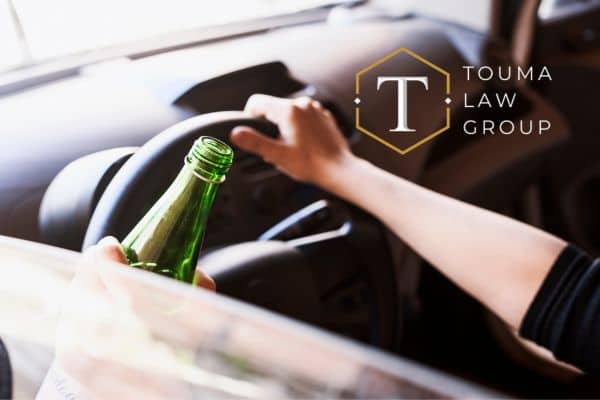If you plan to drive in South Carolina, it’s important to know the state’s laws regarding the transportation of alcoholic beverages. Open container laws are in place to ensure that drivers and passengers are safe on the roadways.
Importantly, South Carolina has had an open container law since 1996, which makes it illegal for passengers to possess open containers of alcohol in motor vehicles. The law applies to all types of vehicles, including cars, boats, and recreational vehicles. Drivers and passengers who fail to comply with this law can face a range of penalties, including fines and potential jail time.

If you have been charged with having an open container in your vehicle or a DUI our Greenville criminal defense attorneys are here to help. Schedule a free consultation today to learn how, call us at [864-618-2323](tel: 864-618-2323).
Legal Definition of an Open Container
An open container of alcohol is any container that has been opened, has a broken seal, or has had its contents partially removed. This includes cans, bottles, cups, and any other type of container that contains alcohol. It’s important to note that even a cup with alcohol is considered an open container in South Carolina.

According to Section 61-4-110 of the South Carolina Code of Law (Title 61),
" It is unlawful for a person to have in his possession, except in the trunk or luggage compartment, beer or wine in an open container in a motor vehicle of any kind while located upon the public highways or highway rights of way of this State."
This means that if you’re found with an open container of alcohol in your motor vehicle, you can face criminal charges.
What is expected, therefore, is that all bottles, cans, or containers should have a sealed lid. Otherwise, passengers are not permitted to bring alcoholic beverages into the motor vehicle, even for personal use.
Exceptions to Open Container Law
There are a few exceptions to South Carolina’s open container laws. For example, passengers for hire, such as those on a bus or in a limousine, are allowed to consume alcohol while in transit. In addition, if you’re transporting alcohol for commercial purposes, such as delivering it to a liquor store, you’re not subject to the same restrictions as individuals transporting alcohol for personal purposes.
Also, Section 61-4-110 of the South Carolina Code of Laws (Title 61), does not prohibit the transporting of beer or wine in a closed container, and this section does not apply to vehicles parked in legal parking places during functions such as sporting events where law enforcement officers are on duty to perform traffic control duties
Special event permits may also allow for the consumption of alcohol in certain circumstances. For example, if you have a permit to host an event in your home or on private property, you may be allowed to transport alcohol for this purpose.
Penalties for Open Containers
If you’re caught with an open container of alcohol in South Carolina, you could face serious penalties. It’s considered a criminal offense, and the potential penalties vary depending on the situation. A first-time offense is considered a minor offense and could result in a fine of up to $100.
However, subsequent offenses carry more severe penalties. A second conviction within three years could result in up to 30 days in jail and a fine of up to $200, while a third or subsequent conviction could result in up to six months in jail and a fine of up to $1,000.
Other Alcohol-Related Laws in SC
In addition to open container laws, South Carolina has several other laws regarding the consumption and transportation of alcohol.

Driving Under the Influence (DUI) and Drunk Driving Laws are in effect throughout the state. It’s illegal to drive with a blood alcohol concentration (BAC) of 0.08 percent or higher, and drivers found in violation of this law can face hefty fines and possible jail time. Furthermore, it’s illegal to purchase alcohol for minors or to provide alcohol to minors, and those in violation of this law can face criminal charges.
How to Legally Transport Alcoholic Beverages
If you’re transporting beer, wine, or other alcoholic beverages in South Carolina, it’s essential to know the laws regarding their transportation. In general, it’s legal to transport alcoholic beverages as long as they’re in closed containers and not accessible to the driver or passengers. However, if you’re transporting an open container of alcohol, you could face penalties.
One way to ensure that you are in compliance with the law is to keep all alcoholic beverages in their original wrappings and store them in the trunk or luggage compartment of the vehicle. This will prevent any potential charges from being brought against you.
Learn More: Check out these South Carolina DUI Statistics!
Also, anyone transporting alcohol in a vehicle should ensure that they are not drinking while they are driving. For instance, it is illegal for someone who has consumed a bottle of wine to be behind the wheel. Apart from the danger this may pose to other motorists and passengers, it is likely to result in criminal charges.
What to Do if You Are Facing Open Container Charges
Open container laws in South Carolina are in place to ensure the safety of drivers and passengers on public highways. Remember: it’s never worth risking your safety or the safety of others by violating open container laws. Always be sure to keep alcohol in closed containers and never transport an open container of alcohol while in a motor vehicle.
If you’re facing an open container charge or any other alcohol-related offense, it’s important to consult with an experienced criminal defense attorney who can help protect your rights and defend your case.
At Touma Law Group, we understand the complexities of South Carolina’s open container law. Our experienced attorneys are here to provide you with legal advice and represent your interests in court. We are a firm for people who need help navigating the legal system, and we will work to ensure your rights are protected in the face of any alcohol charges. Contact us today for a consultation and find out how we can help you.


